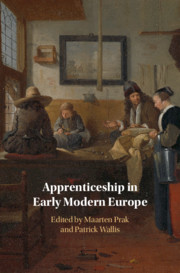Book contents
- Apprenticeship in Early Modern Europe
- Apprenticeship in Early Modern Europe
- Copyright page
- Contents
- Tables
- Figures
- Contributors
- Introduction: Apprenticeship in Early Modern Europe
- 1 The Economics of Apprenticeship
- 2 Artisan Apprenticeship in Early Modern Madrid
- 3 A Large ‘Umbrella’: Patterns of Apprenticeship in Eighteenth-Century Turin
- 4 Apprenticeship in Early Modern Venice
- 5 Actors and Practices of German Apprenticeship, Fifteenth–Nineteenth Centuries
- 6 Rural Artisans’ Apprenticeship Practices in Early Modern Finland (1700–1850)
- 7 Apprenticeships with and without Guilds: The Northern Netherlands
- 8 Apprenticeship in the Southern Netherlands, c. 1400–c. 1800
- 9 Apprenticeship in England
- 10 Surviving the End of the Guilds: Apprenticeship in Eighteenth- and Nineteenth-Century France
- Conclusion: Apprenticeship in Europe – A Survey
- Index
9 - Apprenticeship in England
Published online by Cambridge University Press: 18 October 2019
- Apprenticeship in Early Modern Europe
- Apprenticeship in Early Modern Europe
- Copyright page
- Contents
- Tables
- Figures
- Contributors
- Introduction: Apprenticeship in Early Modern Europe
- 1 The Economics of Apprenticeship
- 2 Artisan Apprenticeship in Early Modern Madrid
- 3 A Large ‘Umbrella’: Patterns of Apprenticeship in Eighteenth-Century Turin
- 4 Apprenticeship in Early Modern Venice
- 5 Actors and Practices of German Apprenticeship, Fifteenth–Nineteenth Centuries
- 6 Rural Artisans’ Apprenticeship Practices in Early Modern Finland (1700–1850)
- 7 Apprenticeships with and without Guilds: The Northern Netherlands
- 8 Apprenticeship in the Southern Netherlands, c. 1400–c. 1800
- 9 Apprenticeship in England
- 10 Surviving the End of the Guilds: Apprenticeship in Eighteenth- and Nineteenth-Century France
- Conclusion: Apprenticeship in Europe – A Survey
- Index
Summary
England was the only pre-modern European country with national legislation covering apprenticeship (the 1562 Statute of Artificers), setting unusually long and uniform seven-year terms. England was also unusual because around three-quarters of all English urban apprentices went to London for their training. Apprenticeships were regulated by a combination of guild rules and private contracts. The latter set individual conditions within the general framework. English apprenticeship fees varied widely, depending on the trade and the master’s reputation. Apprentices were rarely tutored by relatives and commonly choose other trades than their parents had exercised. Many apprentices left their masters early; only those aspiring to become masters themselves stayed on for the whole seven-year period. There was no formal examination at the end, nor other form of certification.
- Type
- Chapter
- Information
- Apprenticeship in Early Modern Europe , pp. 247 - 281Publisher: Cambridge University PressPrint publication year: 2019
- 4
- Cited by

